Timothy Pehrson
President and CEO, INTEGRIS Health
Joining INTEGRIS Health in 2018 as president and CEO, Timothy Pehrson has led efforts to transform the healthcare system through proactive, patient-centered reforms. Before stepping into his role at INTEGRIS, Pehrson served as Regional Vice President and CEO of Continuous Improvement at Intermountain Health in Salt Lake City, Utah, for 18 years. During his time at Intermountain, Pehrson received recognition as a “Healthcare Hero” by Utah Business Magazine.
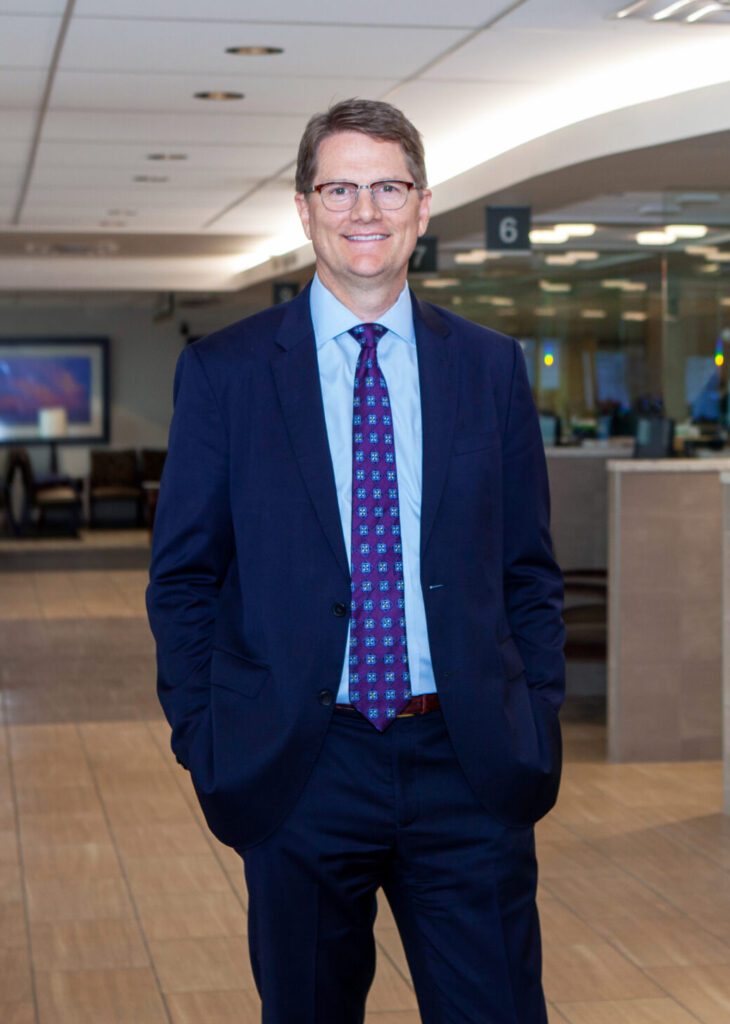
Starting a new chapter in Oklahoma was a big transition for Pehrson and his family. However, with a bit of time under his belt here, he now considers Oklahoma his home.
“As I learned more about INTEGRIS Health, and its impact on Oklahomans, I couldn’t resist the opportunity – and my wife Janice was up for the adventure. We never expected to fall in love with Oklahoma, but that’s exactly what happened,” he says.
During his tenure at INTEGRIS, Pehrson has collaborated alongside the state legislature to move away from providing care on a fee-for-service basis, a compensation model that unfortunately prioritizes quantity of services over quality of care.
“In the new world, we will be rewarded and incentivized to think about people’s total health. Over time, value-based care improves the health of people at a more affordable cost, which is exciting for Oklahomans,” he explains. Pehrson says that these reforms will begin to take effect at INTEGRIS beginning in April.
Pehrson also faced the challenge of leading the INTEGRIS staff through the COVID-19 pandemic less than two years into his appointment. Witnessing the personal sacrifice that caregivers and physicians made inspired him.
“I saw their goodness as they treated people with dignity in their dying moments and acted as surrogate family to patients when their families could not be there due to safety precautions,” he says. “The pandemic reminded me of the great people that work in healthcare, and how much communities rely upon healthcare workers in difficult times.”
When reflecting on his career, Pehrson says that he prioritizes trust over recognition – a principle that guides him in his leadership.
“Trust is earned by providing high quality, well-coordinated healthcare,” he says. “When I see our caregivers and physicians coming together to deliver on that promise, I am delighted, because it means someone in our community is alive today because of our work.” – FH
Brooke Townsend
Director of Community Affairs and Executive Director of the Oklahoma Caring Foundation, Blue Cross and Blue Shield of Oklahoma
Lifelong Oklahoman Brooke Townsend serves the state in various ways – all with the singular goal of improving life for those in the community.
“Upon graduating from OSU, I was introduced to a community role at the Oklahoma Caring Foundation through contacts I had made during my undergraduate internship with the Oklahoma Institute for Child Advocacy,” she says. “I’ve now been at the Oklahoma Caring Foundation and Blue Cross and Blue Shield of Oklahoma for 23 years. I’m proud of my commitment to the community, and the opportunity my role in corporate community relations affords me, as I currently serve on the boards of directors for six non-profit organizations across the state.”
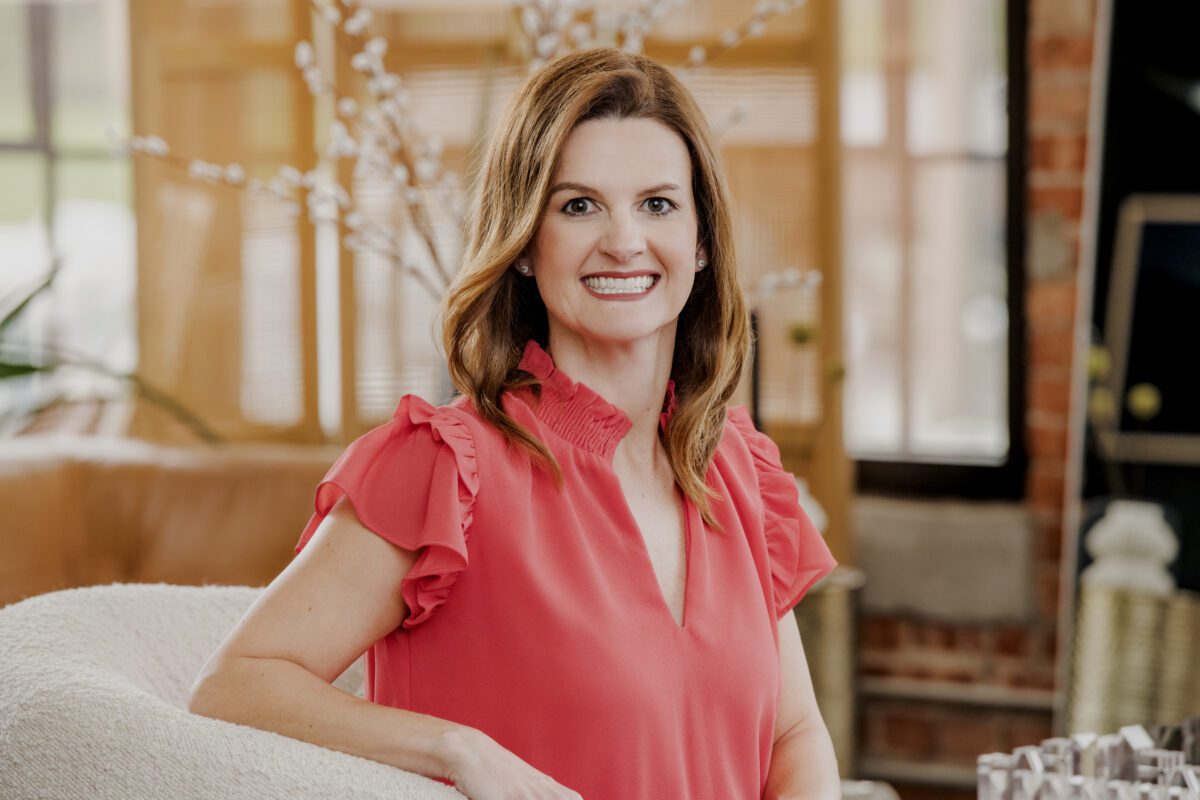
Townsend’s flagship initiative is the Oklahoma Caring Van Program; the nine mobile units deliver immunizations to protect children and adolescents from dangerous illnesses at no cost to their families. Its purpose, she says, is “to improve the health of Oklahomans, one child at a time. The way to remove barriers to accessing healthcare is to meet families – and particularly children – where they spend their days. We partner with childcare providers, schools and other community organizations to serve Oklahomans.”
Acting as executive director of the Oklahoma Caring Foundation is not Townsend’s only responsibility; in her role as director of community affairs for BCBSOK, Townsend’s day-to-day is rich with challenges and opportunities.
“I have the very best job,” she says. “I spend my days connecting with community organizations that share the same values as Blue Cross and Blue Shield of Oklahoma and are working to improve the health and wellbeing of Oklahomans. We build relationships on behalf of the company and support communities where we live and do business.”
The last year has been highlighted by accomplishments.
“The team has worked incredibly hard, launching a new major grants program, forming innovative partnerships with organizations, and the Caring Van team is on track to serve more than 10,000 Oklahomans [in 2023],” she says. “Personally, I am very proud of the leadership I have been in a position to provide to the nonprofit organizations I serve this year. The work is challenging and incredibly fulfilling.”
Townsend, who resides in Oklahoma City with her husband and two children, says she has a lot to be grateful for.
“Most of all, I’m happy that my daughters are thriving and growing to be strong young ladies,” she says. – TL
David Holt
Mayor, City of Oklahoma City; Dean, Oklahoma City University Law School
Oklahoma City Mayor David Holt broke several records when he was elected in 2018. He is OKC’s first Native American mayor, hailing from the Osage tribe. He is also the youngest mayor of Oklahoma City since 1923, and was the youngest mayor of a U.S. city with more 500,000 residents when he first took office.
He is also exceptionally popular, winning his first election with 78.5% of the vote and his second, in 2022, with more votes than any candidate for Mayor since 1959. These are impressive stats on their own, but exceptional for any sort of political leader in today’s divisive climate.
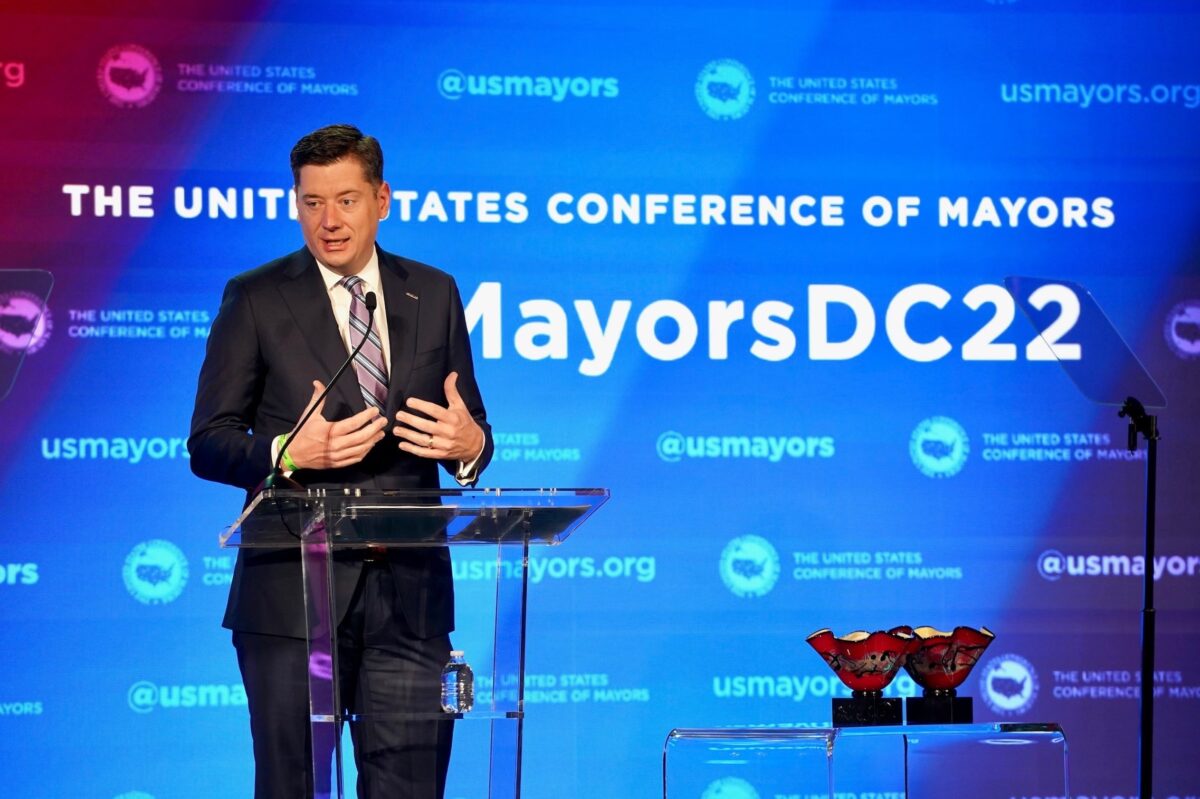
Holt credits Oklahoma City’s nonpartisan electoral system, in part, for his successful career.
“I get to build coalitions of non-extreme Republicans, Democrats and Independents,” he says. “That’s the only way to actually get things done.”
During his first term, Holt rallied voters in support of MAPS 4, a debt-free public improvement program that will help enhance the quality of life and the job market for OKC residents. MAPS 4 funds many important city projects, from the improvement of transportation systems to the construction of the Clara B. Luper Civil Rights Center.
Looking back on 2023, Holt says that renegotiating the Oklahoma City Thunder’s commitment to play in Oklahoma City beyond 2050 was one of his greatest accomplishments. In mid-December, OKC voters passed a measure to fund a new $900 million downtown arena to aid in that effort, extending the MAPS 4 one-cent sales tax for an additional six years.
“I’m not sure the people of Oklahoma City will ever truly know how much the deck was stacked against us in retaining the Thunder, but keeping them was vital to our future,” he says. “There is no question that 2023 will be remembered for cutting the deal to keep the team here for 30 more years.”
In addition to holding public office, Holt is the vice president of the U.S. Conference of Mayors and the Dean of the Oklahoma City University Law School. As a lifelong resident of Oklahoma City, helping improve the local community is personal to Holt.
“This is my hometown, and it’s America’s twentieth-largest city. So it’s easy to care; it’s rewarding to have this opportunity to demonstrate how democratic government can effectively function.”
If Holt’s year wasn’t busy enough, he also made it onto the prestigious TIME100’s Next list for “engineering new solutions to society’s most pressing problems,” according to TIME.
“It was an honor,” says Holt. “Being a big city mayor is the best job in American politics.” – FH
Mautra Staley Jones
President, Oklahoma City Community College
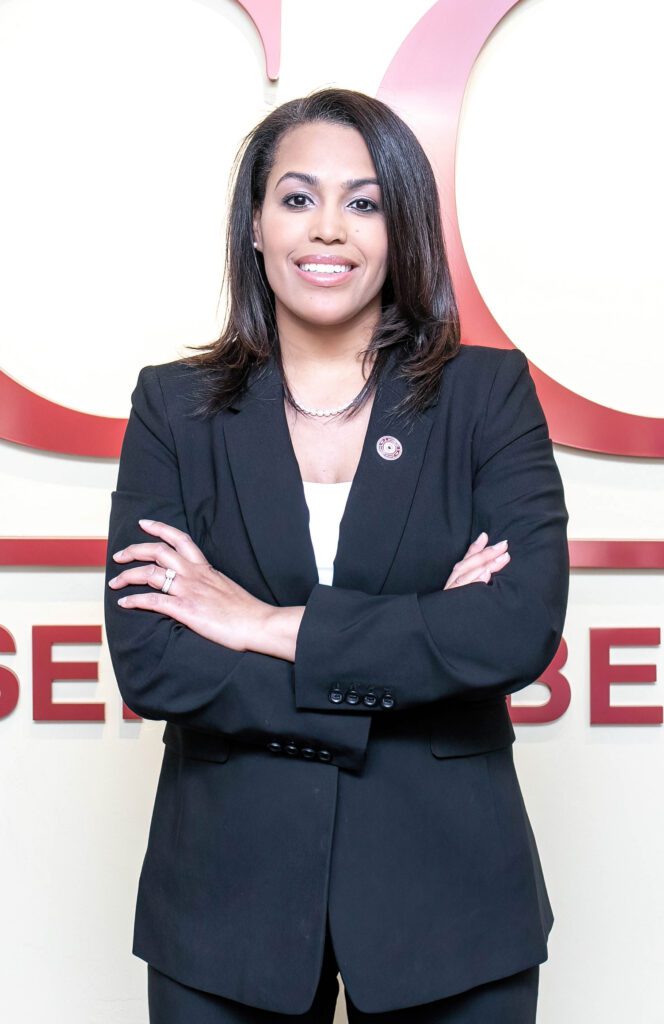
Mautra Staley Jones, Ed.D., made history with her 2022 appointment as president of Oklahoma City Community College; she is the first woman and first person of color to serve in that role. Jones’ other accolades are vast – she was named among the 100 Women to Know in North America by KNOW WOMEN, as well as National Mother of the Year by American Mothers, Inc.
Strong female leadership as a child, Jones says, helped her become who she is today.
“I was born in Oklahoma City and raised in Ardmore by the matriarch of our family, my incredible grandmother,” she says. “She provided me with a solid foundation, despite the many challenges and obstacles faced in my life.”
Jones, a first-generation college graduate, has “always valued the importance of education,” she says. “My passion in this area has motivated me to pursue my career path. The role I play in facilitating and influencing learning pathways inspires me to work hard every day to serve students, employees and anyone who engages with OCCC.”
OCCC educates more than 18,000 students, has a top 25 film program in the U.S. and Canada, a National Center for Academic Excellence in Cyber Defense, and a highly ranked nursing program. Additionally, the college is the state’s largest provider of micro-credentials. Jones sees these cornerstones of excellence and is aiming even higher. How? By properly equipping students, faculty and staff with the tools they need to succeed.
“We are continuing to seek innovative ways to provide education, services and pathways at OCCC. There is something for everyone at the college,” she says. “Our students come to us with a variety of academic needs, and we aim to meet students where they are on their education journeys. Our goal at OCCC is to be the conduit for students that facilitates fulfilling their dreams.”
Outside work, Jones is heavily involved in a variety of efforts; she is a keynote speaker, board director for the Oklahoma Office of Juvenile Affairs and a commissioner for the Oklahoma Merit Protection Commission. Balancing her many responsibilities would seem to many a Herculean task, but Jones has it down to a science.
“I maintain a steadfast commitment to positive energy that allows me to prioritize my responsibilities to my family, to OCCC and to the community,” she says. “Like so many other inspiring women, I am a wife and a mother, a friend and a mentor, and all of these roles comprise who I am professionally.” – TL
Bill Lance
Secretary of State, Chickasaw Nation
A fifth-generation Oklahoman, Bill Lance is the first-ever Secretary of State for the Chickasaw Nation. Before this appointment in 2022, Lance was the longest-serving Secretary of Commerce in Chickasaw Nation history, and also served as administrator of the tribal health system. Notable achievements under his leadership include a tripling of the Nation’s annual net income, the creation of more than 7,000 jobs, and the opening of the 370,000-square-foot Chickasaw Nation Medical Center in Ada.
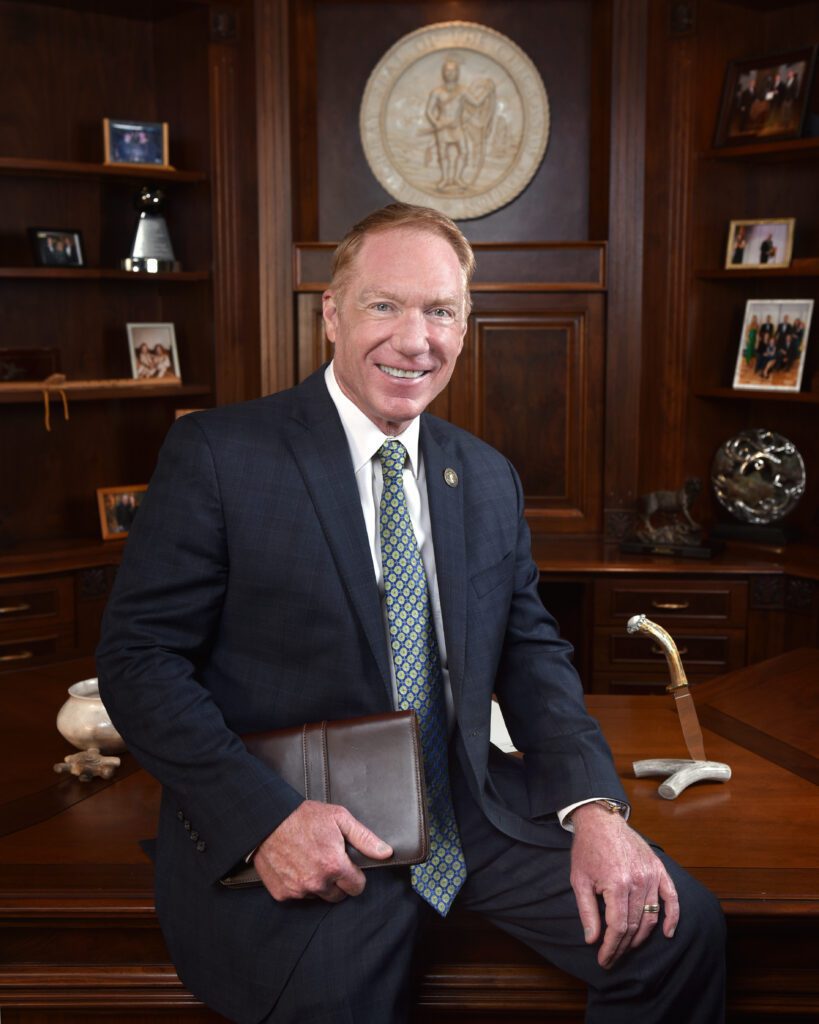
Alongside his ample day-to-day responsibilities, Lance actively serves on multiple community and corporate boards – “too many to mention,” he says. His honors include becoming a Global Achievement Honoree by Sister Cities Oklahoma City International, as well as his inductions into the Oklahoma Hall of Fame and the Oklahoma Commerce & Industry Hall of Honor at Oklahoma City University’s Meinders School of Business.
There’s no precedent – or predecessor – for his current Secretary of State position, meaning he’s writing the script himself. In addition to serving as a key policy advisor to Chickasaw Nation Governor Bill Anoatubby, Lance says, “I oversee all of the executive branch related to the tribal state, federal and community policy work, and work with many, many trade associations – like the American Gaming Association, where I am on the executive committee and general board. For the past ten years, I’ve been a delegate representative of the Chickasaw Nation Intertribal Council.”
Looking forward, Lance will continue to mentor and coach various executives within the Chickasaw Nation Department of Commerce, now that he’s transitioned out of the role he held since 2009. Additionally, he continues to provide advice and counsel to many commercial LLC boards owned by the Nation.
When asked which of his many accomplishments he’s most proud of as they relate to the Nation, Lance mentions those that have positively affected the most people.
“Because I was involved initially in our healthcare system, I’m proud of the advancements we’ve made in our healthcare facilities and services within the Chickasaw Nation, ensuring better access and quality of care for our people,” he says. “I am also honored to have been at the helm of the Commerce Department during its exponential growth and business diversification efforts as envisioned by Governor Anoatubby. These initiatives have not only strengthened our community, but also secured a vibrant future for our next
generations.” – TL
Natasha Bray
Dean, OSU College of Osteopathic Medicine at the Cherokee Nation
Born and raised in Oklahoma, Natasha Bray, D.O., has a passion for improving healthcare in rural and underrepresented communities. Serving as the dean for the OSU College of Osteopathic Medicine at the Cherokee Nation (OSU-COM-CN), she has helped trailblaze educational programming for the nation’s first and only tribally affiliated medical school.
OSU-COM-CN opened its doors in 2020. Located in Tahlequah, the school offers a specialized program called the Tribal Medical Track, which prepares medical students for a primary care residency at tribal facilities in Oklahoma. Bray believes that giving students the opportunity to work in the communities they will serve helps them better understand and treat the unique health challenges of their patients.
To expose students to tribal culture, OSU-COM-CN works alongside Cherokee leadership. The facility houses over 190 artworks from Cherokee artists and a collection of Native American literature.
“We recognize that so much of how we interact with each other is based on stories and personal experiences, and how those are shared,” Bray says.
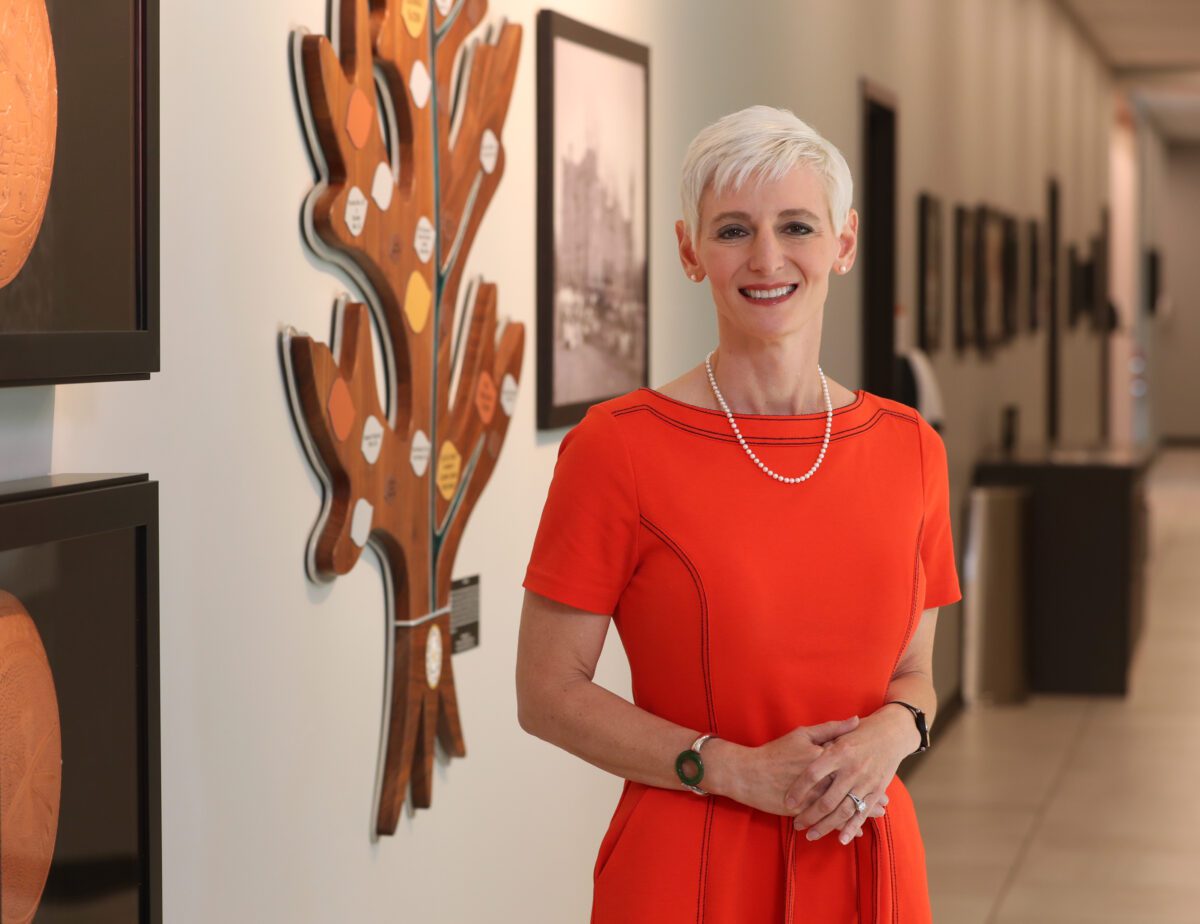
Working at OSU-COM-CN is a meaningful opportunity for Bray, especially since she earned her medical degree in osteopathic medicine from OSU-COM. After graduating, Bray completed her residency at the Philadelphia College of Osteopathic Medicine and secured a fellowship at the Cambridge Health Alliance.
Bray has played a major part in the development, accreditation and delivery of graduate and undergraduate programs at several educational institutions. For five years, she served as Vice President of Academic Affairs and Designated Institutional Official at Broward Health in Florida. She was also the Associate Dean of Clinical Medicine at the Arkansas College of Osteopathic Medicine.
Through her role at OSU-COM-CN, Bray hopes to inspire a new generation of students to dream big.
“We want every kid in Oklahoma to feel like they can become a physician, pharmacist or nurse,” she says.
In 2024, OSU-COM-CN will celebrate its first graduating class of 46 future physicians.
“It’s been an extremely powerful learning opportunity,” she says. “I can’t overstate the talent of our students and their willingness to lean into their experiences to serve their communities. It is an inspiration to me every day.” – FH
Warren Ross
CEO, Ross Group
Almost 30 years ago, Warren Ross became a project manager and engineer at a small contracting company owned by his father, Jesse. Through steady, organic growth, the business – now Ross Group Construction Corporation – has secured multi-million dollar projects and expanded to three locations with over 125 employees.
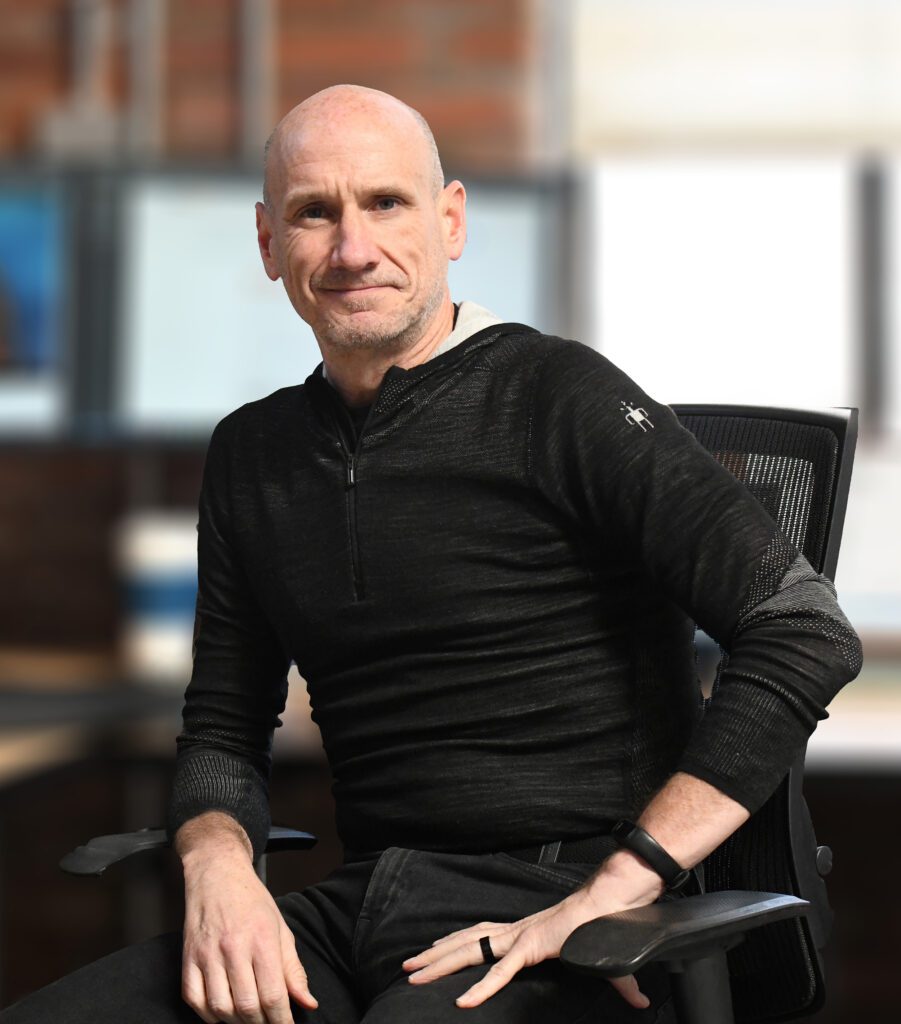
Ross himself has grown alongside the company, eventually stepping into the positions of chairman and CEO. Working alongside his father, Ross learned how to lead by example.
“The respect and adoration that I feel for my dad is immense,” he says. “His integrity in honoring his agreements, regardless of the actions of counterparties, has become the standard by which we operate – we deliver on our commitments,” he says.
Ross Group has built – both literally and metaphorically – a reputation for helping transform downtown Tulsa, spearheading projects like the restoration of the Tulsa Club Hotel and construction of the Vast Bank Building. In 2023, Ross Group completed the engineering, procurement and construction of two dehydration plants in less than 120 days.
“These challenges are the types of projects that make memories and stories, as well as give us the motivation to accept the next challenge,” says Ross.
However, the path to success has not come without its obstacles. In 2002, Ross Group took out a hefty business loan. To pay it off, the company needed to muster up $50,000 weekly. Despite the financial pressures, Ross upheld the decision to keep the company privately owned.
“The independence that I have enjoyed in building the business is not something that I am willing to compromise by admitting external investors and a board of directors,” he says. “It has taken me 28 years working to appreciate the discipline that my dad had for his entire career.”
In the coming year, Ross Group will finish the historical restoration of the Exchange within the Sinclair Building in Tulsa, which was originally built in 1919 by oil tycoon Henry Sinclair. When complete, the building will provide additional housing in downtown Tulsa.
Self-improvement is also on Warren Ross’s agenda for 2024.
“I plan to keep working on my leadership development for at least another 30 years,” he says. “As an eternal optimist, I anticipate improvement and evolution.” – FH























